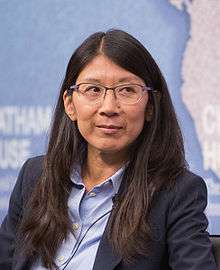Joanne Liu
Joanne Liu, M.D., C.M., is a Canadian pediatric emergency medicine physician, Associate Professor of Medicine at the University of Montreal, Professor of Clinical Medicine at McGill University, and the previous International President of Médecins sans frontières (MSF, or Doctors Without Borders).[1] She was elected president during MSF's International General Assembly in June 2013.[2]
Joanne Liu | |
|---|---|
 Liu at Chatham House in 2015 | |
| Born | Quebec City, Quebec, Canada |
| Citizenship | Canada |
| Alma mater | McGill University New York University Université de Montréal |
| Known for | International president of Médecins Sans Frontières |
| Awards | National Order of Quebec Time 100 |
| Scientific career | |
| Fields | Pediatrics, Emergency Medicine |
| Institutions | Médecins Sans Frontières Université de Montréal McGill University |
| Joanne Liu | |||||||||||||
|---|---|---|---|---|---|---|---|---|---|---|---|---|---|
| Traditional Chinese | 廖滿嫦 | ||||||||||||
| |||||||||||||
Early life
Joanne Liu was born on 4 November 1965, Quebec City, Quebec, Canada, to a Chinese immigrant Liu family from Taishan, Guangdong. Her family ran a Chinese restaurant called China Garden. Dr Joanne Liu was the fifth child after David, a child stillborn, Anthony, and Margaret. When she was thirteen, she became fascinated by Et la Paix dans le monde docteur, a book about the experiences of a physician working with Doctors Without Borders during the Soviet–Afghan War. She dreamed of becoming "a doctor without borders" one day.[3]
Education and training
During junior college, Cegep Champlain St. Lawrence, Quebec City, she travelled to Mali with Canadian Crossroads International.[2] Liu graduated from the McGill University Faculty of Medicine with the M.D., C.M. degree and completed pediatric specialty training at the Université de Montréal-affiliated Centre hospitalier universitaire Sainte-Justine. She then completed a sub-specialty in pediatric emergency care at Bellevue Hospital Center of the New York University School of Medicine and an International Master's in Health Leadership degree at the McGill University Desautels Faculty of Management.
Career
Liu started her career with Médecins Sans Frontières, in 1996 when she worked with Malian refugees in Mauritania. Since then she has provided support through the 2004 Indian Ocean earthquake and tsunami; assisted in controlling a cholera epidemic in Haiti; helped Somali refugees in Kenya; and offered medical assistance in many conflict zones, including Palestine, Central African Republic and Sudan's Darfur region. She has also helped to develop one of the first programs to offer comprehensive medical care for survivors of sexual violence in the Republic of the Congo.[4]
From 1999 to 2002, Liu was a programs manager at the Paris office of MSF. She then went on to work as the president of the board of directors of MSF in Canada between 2004 and 2009. She has helped to create and currently co-manages the organization's telemedicine project, which connects MSF physicians in 150 remote sites with a platform of over 300 medical specialists across the globe. By communicating through the specialist network, MSF field doctors can receive critical diagnoses and treatment recommendations for their patients within hours.
From 2002 to 2013, Liu served as a full-time Pediatric Emergency Physician at Ste-Justine Hospital in Montreal and at the Health Travel Clinic of the Centre hospitalier de l'Université de Montréal. She is also an associate professor at the Université de Montréal.[5]
In October 2013, Liu commenced as International President of Médecins Sans Frontières (MSF), in Geneva.
On 2 September 2014, Liu gave a briefing to the United Nations General Assembly, urging member states to mobilize against the Ebola epidemic in West Africa.[6]
On 7 October 2015, Liu demanded an independent investigation of the American bombing of the MSF hospital in Kunduz, Afghanistan.[7] She denounced the bombing and suggested that it was a war crime.[8]
Other activities
- Coalition for Epidemic Preparedness Innovations (CEPI), Member of the Board (2018–present)[9][10]
- Drugs for Neglected Diseases Initiative (DNDI), Member of the Board of Directors[11]
References
- "Dr Christos Christou, new International President of MSF, 9 September 2019". MSF.org. Retrieved 31 March 2020.
- "Dr. Joanne Liu Elected President of Médecins Sans Frontières (MSF) International", McGill University: 10 July 2013
- Biography, drjoanneliu.com
- Dr Joanne LIU new International President of MSF, www.msf-seasia.org: 10 October 2013
- "Joanne Liu: doctor without borders Archived 3 March 2016 at the Wayback Machine", Université de Montréal: 4 September 2013
- MSF International President United Nations Special Briefing on Ebola, www.msf.org: 2 September 2014
- "Obama Issues Rare Apology Over Bombing of Doctors Without Borders Hospital in Afghanistan", The New York Times: 7 October 2015
- Lui presumes bombing a war crime, Washington Post, 7 October 2015
- Board Coalition for Epidemic Preparedness Innovations (CEPI).
- CEPI announces new permanent board Coalition for Epidemic Preparedness Innovations (CEPI), press release of January 24, 2018.
- Board of Directors: Joanne Liu Drugs for Neglected Diseases Initiative (DNDI)-